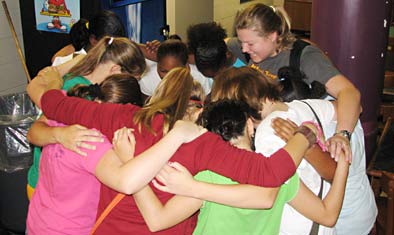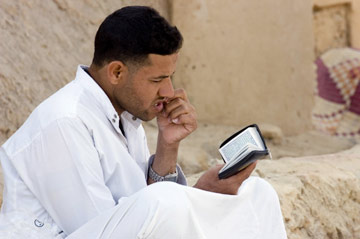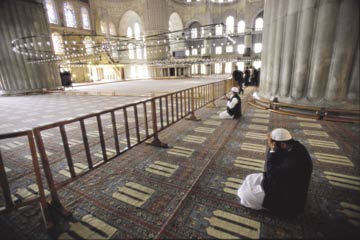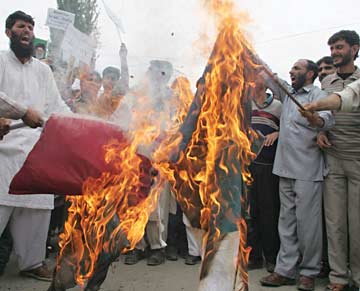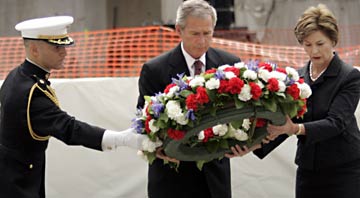2006 Archives
-
âJesus and Meâ camp benefits Brenhamâs children
Updated: 9/21/06
House of Worship Church in Brenham partners with Brenham school district to offer eight weeks of games, crafts, Scripture memorization and science and reading programs during the summer. ‘Jesus and Me’ camp benefits Brenham’s children
By Elizabeth Staples
Communications Intern
BRENHAM—For a dozen years, children from low-income families in the Brenham area have formed lasting relationships, developed important skills and learned spiritual values at JAM—the “Jesus and Me” summer day-camp.
Many children, ages 5 to 12, experience Christ’s love for the first time during the day-camp, said Marcus Lawhon, director of JAM and pastor of House of Worship Church in Brenham.

The Brenham Housing Authority and the school district have partnered with JAM to provide free breakfast and lunch for the children. 09/21/2006 - By John Rutledge
-
Islam built on five pillars of worship & five pillars of faith
Posted: 9/15/06
A young Egyptian studies the Quran, Islam’s holy book. Islam is not only Egypt’s dominant religion but an all-embracing way of life. Egyptian Muslims comprise 90 percent of the nation’s more than 76 million people. (BP photo by Warren Johnson) Islam built on five pillars
of worship & five pillars of faithBy Ken Camp
Managing Editor
DALLAS—Muslims treat the Quran as their Bible, and they see Muhammad the way Christians view Jesus Christ, right? Wrong, Muslim leaders insist.
Muslims see the Quran as God’s final revelation—roughly comparable to the way mainstream Christians see Jesus Christ as the Living Word and God’s ultimate revelation, said Alif Rahman, who teaches an outreach class about Islam at the Dallas Central Mosque in Richardson.
09/21/2006 - By John Rutledge
-
-
For American Muslims, everything changed on 9/11
Posted: 9/15/06
Turkish Muslims worship inside Istanbul's famed Blue Mosque. (BP photo) For American Muslims,
everything changed on 9/11By Ken Camp
Managing Editor
DALLAS—Everything changed on 9/11—at least for American Muslims. But whether the change has been for the better or the worse depends on personal perspective and individual experience.
Waco’s Muslim community meets in a nondescript building behind an auto repair shop and a convenience store. The Islamic house of prayer—about 25 miles from President Bush’s Crawford ranch—shares a parking lot with a small Primitive Baptist church. No outside sign identifies the place of worship, but its identity is no secret, said Al Siddiq, president of the Islamic Center of Waco.
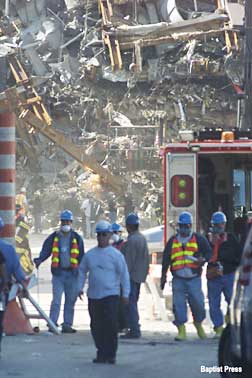
Five years after terrorists attacked the World Trade Center towers in New York, Muslims in the United States assess changes in their relationships with American Christians. This file photo shows rescue workers cutting through steel beams lodged in the ruins of the World Trade Center. (BP File photo by Jim Veneman) 9/11 Five Years Later
• For American Muslims, everything changed on 9/11
• Differentiate 'Muslim' from 'terrorist' scholars say
• No sweeping revival, but impact of 9/11 still felt in churches
• Negative perceptions of Muslims persist, panel says
• Who's Who in Islam: major groups
• Christian presence in Holy Land small and getting smaller
• Islam built on five pillars of worship & five pillars of faith
• Poll shows some prejudice against Muslims
• Children of Abraham: Muslims view God, church & state through different lenses
09/17/2006 - By John Rutledge
-
Differentiate ‘Muslim’ from ‘terrorist’ scholars say
Posted: 9/15/06
Kashmiri activists belonging to Tehreek-e-Wahdat-e-Islami outfit burn a U.S. flag during a protest against Israeli attacks on Lebanon and the Palestinian territories. Similar images from the Middle East present an unfair characterization of Islam in the minds of Americans, some Muslims in the United States insist. (REUTERS photo by Danish Ismail) Differentiate 'Muslim'
from 'terrorist' scholars sayBy Ken Camp
Managing Editor
DALLAS—Flag-burning radical Muslims represent mainstream American Islam about as accurately as cross-burning Ku Klux Klansmen represent Baptists, a Texas Baptist theology professor believes.
“Most American Muslims are not sympathetic to radical Islam, and they are not interested in being identified with the extremists. They just want to be able to do their jobs, raise their children and be good neighbors,” said Ron Smith, senior professor of theology at Hardin-Simmons University’s Logsdon School of Theology.
09/17/2006 - By John Rutledge
-
Children of Abraham: Muslims view God, church & state through different lenses
Posted: 9/15/06
Munir Akhtar of Kendall Park, N.J., reads in the mosque at the Islamic Society of Central Jersey before evening prayers. (RNS photo by Tony Kurdzuk/The Star-Ledger) Children of Abraham: Muslims view God,
church & state through different lensesBy Ken Camp
Managing Editor
DALLAS—Christians and Muslims worship the same God; the Father of the Lord Jesus Christ and Allah of the Quran are nothing alike. Jihad means an inner struggle to obey God’s will; jihad means waging holy war on infidels.
Muslims support human rights and religious freedom; Muslims practice oppression and want to impose Islamic law on non-Muslims.
09/17/2006 - By John Rutledge
-
-
No sweeping revival, but impact of 9/11 still felt in churches
Posted: 9/15/06
President Bush and First Lady Laura Bush lay a wreath at the site of the World Trade Center in New York during a ceremony to commemorate the fifth anniversary of the Sept. 11, 2001 attacks. (Photo by Keith Bedford/REUTERS) No sweeping revival, but impact
of 9/11 still felt in churchesBy John Hall
Texas Baptist Communications
The Sept. 11, 2001, terrorist attacks upon the United States didn’t produce the widespread revival some Christian leaders predicted, but commentators believe the events of that day continue to affect church ministry.
Five years after the attacks on New York City and Washington D.C., the spike in worship attendance that occurred after Sept. 11 appears to be an anomaly. Within a month of the attacks, worship attendance had returned to pre-Sept. 11 levels in most places as people returned to their respective routines.
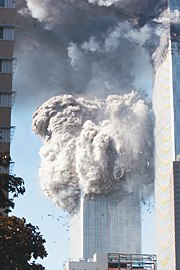
World Trade Center towers collapsing in New York City after the Sept. 11, 2001, terrorist attack. (Reuters Photo) • Read the Standard's coverage in our Sept. 17, 2001, issue of Baptist response to the crisis.
09/15/2006 - By John Rutledge
-
Negative perceptions of Muslims persist, panel says
Posted: 9/15/06
Negative perceptions of Muslims persist, panel says
By Hannah Elliott
Associated Baptist Press
SALT LAKE CITY (ABP)—Days before the five-year anniversary of the Sept. 11, 2001, terrorist attacks, a panel of Muslims discussed media-perpetrated misperceptions of Islam and a “climate of negativity” in the United States—particularly concerning the war on terror.
Laila Al-Marayati, an activist with the Muslim Public Affairs Council, said civil liberties ranks as one of the most important topics for Muslims. Non-Muslims not only accept that Muslims will bear the brunt of civil liberty violations, but also expect Muslims to accept it as the price to pay for living in America
09/15/2006 - By John Rutledge





